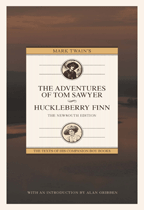 The nation, and even the world, is still talking about Alan Gribben‘s new edition of Huckleberry Finn, which eliminates the notorious n-word. The general public seems to be agin’ it — except for educators, who are showing an interest. Although the conversation is winding down, I expect it will continue for some time to come.
The nation, and even the world, is still talking about Alan Gribben‘s new edition of Huckleberry Finn, which eliminates the notorious n-word. The general public seems to be agin’ it — except for educators, who are showing an interest. Although the conversation is winding down, I expect it will continue for some time to come.
The latest installment comes from Elaine Ray, journalist and cofounder of the Parent Network for Students of Color. (She is also, by the way, editor of My Father’s Posts, an intriguing exploration of the writings of her Barbados-born father, also a journalist.) Here it is:
Imagine being a 12 or 13-year-old Asian-American middle school student in our pre-“post racial society.” You are in a school in which there are only a handful of black students and race is rarely dealt with in a direct or constructive way, though racially tinged adolescent jokes and taunts are common. Now imagine being a black girl in that class watching your Asian friend squirm as he is asked to read passages from Huckleberry Finn aloud to the rest of his mostly white class.
I am the parent of that black girl who came home from 7th grade that day horrified at her friend’s embarrassment. Of course, my daughter probably felt her own anguish, but it was easier to project her discomfort on to her friend.
When her father and I approached the teacher about that discomfort, the teacher’s best defense was that she didn’t believe in censorship. I tried to explain to the teacher that I was with her on that, but it was not “whether” she taught the novel that I was concerned about, but “how” she prepared her students for what they were being asked to read. I suggested that she review the work of scholars who had devoted their life’s work to exploring effective approaches to teaching the book.
She didn’t seem to get it, but I trust that in the intervening years, she’s gained some experience as a teacher and has a better understanding of the issue. Perhaps she’s reading the current debate.
My argument has always been that the novel should be taught as it is, but that the adult who is responsible for introducing it to students better damn well know what he or she is doing. Not only do these teachers need to understand and have the skills to articulate the context in which the novel was written, they also need to understand who their students are and the racial context of their lives. Internalizing Jim’s humiliation might be far different in a classroom with a critical mass of black students than it would be in a room in which there is only one.
My daughter’s friend likely was no stranger to the N-word, which by then had pervaded popular culture, but he was sophisticated or intuitive enough to understand the difference between the word’s use in a bravado-filled rap song and its use as a tool of derision in the mouth of Huck.
In a Jan. 16, op-ed piece in the New York Times, author Lorrie Moore writes that the novel is best saved for “college — or even graduate school — where it can be put in proper context.”
She argues that at a time when people are asking themselves how to get boys, particularly black American boys, to read, Huckleberry Finn is likely to turn them off.
“The young black American male of today, whose dignity in our public schools is not always preserved or made a priority, does not need at the start of his literary life to be immersed in an even more racist era by reading a celebrated text that exuberantly expresses everything crazy and wicked about that time . . ..” Moore writes.
What impact the 7th grade experience had on the members of my daughter’s class, I’ll probably never know. But there is no doubt that her teacher’s cavalier approach to the novel made the prospects for an honest discussion about race in America ever more unlikely.
In “Send Huck Finn to College,” Moore also points out that the remedy is not to replace “nigger” with alternative terms like “slave,” since “the latter word is already in the novel and has a different meaning from ‘nigger,’ so that substitution just mucks up the prose — its meaning, its voice, its verisimilitude.” She writes:
“Huckleberry Finn is suited to a college course in which Twain’s obsession with the 19th-century theater of American hucksterism — the wastrel West, the rapscallion South, the economic strays and escapees of a harsh new country — can be discussed in the context of Jim’s particular story (and Huck’s).
An African-American 10th grader, in someone’s near-sighted attempt to get him newly appreciative of novels, does not benefit by being taken back right then to a time when a young white boy slowly realizes, sort of, the humanity of a black man, realizes that that black man is more than chattel even if that black man is also full of illogic and stereotypical superstitions.”
Shelley Fisher Fishkin, incidentally, agrees with Elaine. In an article about the controversy in The Scotsman, she said: “Huckleberry Finn is a very challenging book to teach, and if teachers are not prepared to engage in the history of racism in America then they probably shouldn’t teach it,” says Fishkin. “But I think a better strategy than bowdlerisation is to give teachers the tools to teach it effectively. For the last three decades I have been involved in doing that.”
(Incidentally, the journalist, Dani Garavelli, wrote about the n-word: “Indeed, even writing this article presented a dilemma, as it is has long been the editorial policy of Scotland on Sunday that the word be printed with asterisks, one of only three words that fall into that category, the others being two commonly used swear words.”)
Postscript on 1/20: From Frank Wilson over at Books Inq.: “Here’s an idea: Start the class by playing some rap tunes in which the dreaded word appears. Then ask if anybody found the use of the word in those songs offensive. Then read a passage from Huck in which the word also appears. Then ask the same question.”
Postscript on 1/21: Over at Bill Peschel‘s blog — “Would Mark Twain have removed n***** from Huck Finn? Hell, yes“:
“…Twain had a history of censoring his works, even on “Huckleberry Finn.” He was a working writer, supporting his growing family, his big house in Hartford and his investment in an invention that would have revolutionized newspaper typesetting if it had worked. He worked for a living, and he shaped his writing and his opinions accordingly.”
Bill tells the story about how Twain had three people “patrolling the pages of Huck Finn for outrages against public taste.” It’s here.
Tags: "Shelley Fisher Fishkin, Alan Gribben, Elaine Ray, Lorrie Moore





January 22nd, 2011 at 6:23 pm
Many who defend the unlimited freedom of artists to create graphically sexual and blasphemous photos at public expense in the name of freedom of speech and against the bugabear of censorship (even though these images hurt and offend many) now seem willing to bend the same principles, for what? Because some people will be hurt and offended by the N word? And the people who will be hurt and offended are who? The same people who listen to music whose lyrics use the N word constantly?
Anybody besides me see this as a huge contradiction?
January 23rd, 2011 at 8:15 am
[…] weighed in on the debate about the novel Huckleberry Finn in my colleague Cynthia Haven’s blog The Book Haven. There’s a current debate over a new edition of the novel in which the word […]
November 28th, 2011 at 10:40 pm
Amazon Free Shipping…
[…]Teaching Huck Finn: Novices need not apply. | The Book Haven[…]…
January 7th, 2012 at 3:17 pm
[…] I continue, here’s a link to the latest commentary from Book Haven, and the Professor Alan Gribben’s defense of his action on the Colbert […]